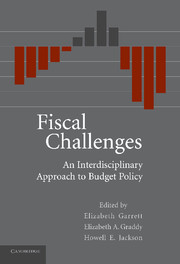Book contents
- Frontmatter
- Contents
- Preface
- Contributors
- PART ONE THE LAW AND POLITICS OF FISCAL POLICY
- PART TWO UNDERSTANDING FEDERAL DEFICITS AND PUBLIC DEBT
- PART THREE BUDGETING AND FISCAL CONSTRAINTS AT THE STATE LEVEL
- PART FOUR INTERGOVERNMENTAL ASPECTS OF BUDGET POLICY
- PART FIVE JUDICIAL POWERS AND BUDGET POLICY
- Index
Preface
Published online by Cambridge University Press: 23 December 2009
- Frontmatter
- Contents
- Preface
- Contributors
- PART ONE THE LAW AND POLITICS OF FISCAL POLICY
- PART TWO UNDERSTANDING FEDERAL DEFICITS AND PUBLIC DEBT
- PART THREE BUDGETING AND FISCAL CONSTRAINTS AT THE STATE LEVEL
- PART FOUR INTERGOVERNMENTAL ASPECTS OF BUDGET POLICY
- PART FIVE JUDICIAL POWERS AND BUDGET POLICY
- Index
Summary
How should the government spend society's limited resources? What rules and procedures should legislative bodies and executive officers follow in making spending decisions? To what extent should the government limit itself to spending that can be financed through current taxes, and to what extent should the government rely on the issuance of public debt that will impose financial burdens on future generations? How can we tell if the government's deficits are too high and its public debts too large? What role can and should the general public play in monitoring or defining fiscal priorities? To what extent can constitutional or quasi-constitutional constraints on budget-making procedures improve a country's fiscal decisions? Can we depend on the judiciary to enforce constitutional or other restraints on fiscal policies?
These are deep and difficult questions, and no single academic discipline can provide complete answers. Undoubtedly, economics offers important insights into the implications of annual deficits and the accumulation of public debts. But one must also be versed in the study of political science and the behavior of complicated organizations such as legislative bodies in order to understand the impact and potential consequences of budgetary rules and procedures. The processes whereby the general public forms opinions about matters of public finance – rational and otherwise – also have a place in the study of budget policy. Even some knowledge of the principles of financial accounting is necessary in order to evaluate how the country's financial condition might best be summarized and communicated to broader audiences.
Information
- Type
- Chapter
- Information
- Fiscal ChallengesAn Interdisciplinary Approach to Budget Policy, pp. vii - xPublisher: Cambridge University PressPrint publication year: 2008
